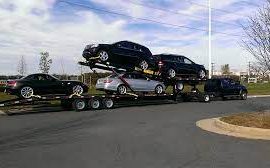When it comes to transporting your prized possession—your car—nothing beats the reliability and convenience of a car trailer. Whether you’re a seasoned car enthusiast or a first-time trailer buyer, finding the perfect car trailer can be a daunting task. Fear not! We’ve compiled the ultimate guide to help you make an informed decision and ensure that you choose the trailer that suits your needs like a glove.
1. Determine Your Car’s Weight and Dimensions
Before diving into the vast world of car trailers, the first step is to know your car inside out. Check your vehicle’s weight, dimensions, and any special features that might affect trailer compatibility. This crucial information will be the North Star guiding you through the selection process.
2. Understand Different Trailer Types
Car trailers come in various types, each serving a specific purpose. The most common types include open car trailers, enclosed car trailers, and flatbed trailers. Open trailers are cost-effective and provide easy access, while enclosed trailers offer protection from the elements. Flatbed trailers are versatile, allowing you to haul different types of cargo.
3. Consider Your Budget
Your budget is the chief architect of your decision-making process Car trailers come in a wide range of prices so it’s essential to set a realistic budget before browsing Keep in mind that while it’s tempting to go for the cheapest option investing a bit more upfront can save you money in the long run
4. Think About Trailer Materials
Trailers are typically made from steel or aluminum Steel trailers are durable and cost-effective but they are prone to rust On the other hand aluminum trailers are corrosion-resistant light weight and more expensive. Consider the weather conditions in your area and how often you plan to use the trailer when deciding on they material
5. Check Trailer Axles and Suspension
The number of axles on a trailer affects its capacity and stability. Single-axle trailers are suitable for smaller cars, while dual-axle trailers provide better stability and weight distribution for larger vehicles. Additionally, consider the suspension system—leaf spring suspension is common and robust, while torsion suspension provides a smoother ride.
6. Brake Systems Matter
Brakes are crucial for safety, and different trailers come with various brake systems. The two main types are electric brakes and surge brakes. Electric brakes require a brake controller in the towing vehicle, while surge brakes are hydraulic and activate when the trailer pushes against the tow vehicle. Make sure the trailer’s braking system aligns with your vehicle’s capabilities.
7. Tire and Wheel Considerations
Inspect the tires and wheels of the trailer. Ensure they are in good condition, properly inflated, and match the load capacity of the trailer. Investing in quality tires and wheels is a wise decision to prevent blowouts and ensure a smooth towing experience.
8. Pay Attention to Trailer Hitch Compatibility
Not all trailers are compatible with every hitch. Check the hitch class and weight rating on both your vehicle and the trailer. Ensure that your vehicle’s hitch is up to the task and matches the trailer’s requirements. It’s a simple yet crucial step to avoid compatibility issues and ensure safe towing.
9. Think About Storage and Maneuverability
Consider where you’ll store the trailer when it’s not in use. If space is limited, an open or flatbed trailer might be a more practical choice. Additionally, think about how easy the trailer is to maneuver. Tandem axle trailers are more stable but can be less maneuverable than single-axle trailers, especially in tight spaces.
10. Research Local Regulations and Requirements
Before hitting the road with your new trailer, familiarize yourself with local regulations and requirements. This includes trailer registration, licensing, and any specific towing laws. Adhering to these guidelines ensures a hassle-free and legal towing experience.
11. Consider Ramp Options
When selecting a car trailer, think about how your car will be loaded and unloaded. Some trailers come with built-in ramps, making it easier to drive your car onto the trailer. Others may require additional ramps or accessories. Assess the convenience of loading and unloading, especially if you plan to transport your car frequently.
12. Evaluate Trailer Flooring
The type of flooring on a car trailer can impact both the trailer’s durability and your car’s safety during transport. Common flooring materials include wood, steel, and aluminum. Wooden floors provide good traction but may require more maintenance, while steel and aluminum offer durability and are easier to clean. Choose a trailer with flooring that suits your preferences and the type of cars you’ll be hauling.
13. Check for Tie-Down Points
Securing your car properly is paramount during transportation. Check for sufficient tie-down points on the trailer. D-rings or stake pockets are common attachment points for straps or chains. The more tie-down points, the better you can secure your car and ensure it remains in place during transit.
14. Examine Trailer Lighting
Proper lighting is not only a legal requirement but also crucial for safety on the road. Check that the trailer has functional brake lights, turn signals, and reflectors. LED lights are preferred for their longevity and brightness. Regularly inspect and maintain the trailer lights to ensure they are visible and operational, reducing the risk of accidents.
15. Research Brand Reputation and Reviews
Before finalizing your decision, research the reputation of the trailer manufacturer or brand. Look for customer reviews and testimonials to gain insights into the experiences of other trailer owners. A reputable brand with positive feedback is more likely to provide a reliable and durable product. Pay attention to any recurring issues mentioned in reviews to make an informed choice.
Conclusion
Choosing they perfect car trailer involves thorough consideration of various factors, from the type of trailer to its materials features and safety aspects. Don’t rush the decision-making process;take the time to assess your specific needs and preferences A well-chosen car trailer will not only ensure the safe transportation of your vehicle but also provide peace of mind on the road. As you embark on your trailer-buying journey keep these additional considerations in mind to make the best choice for your car and towing needs



